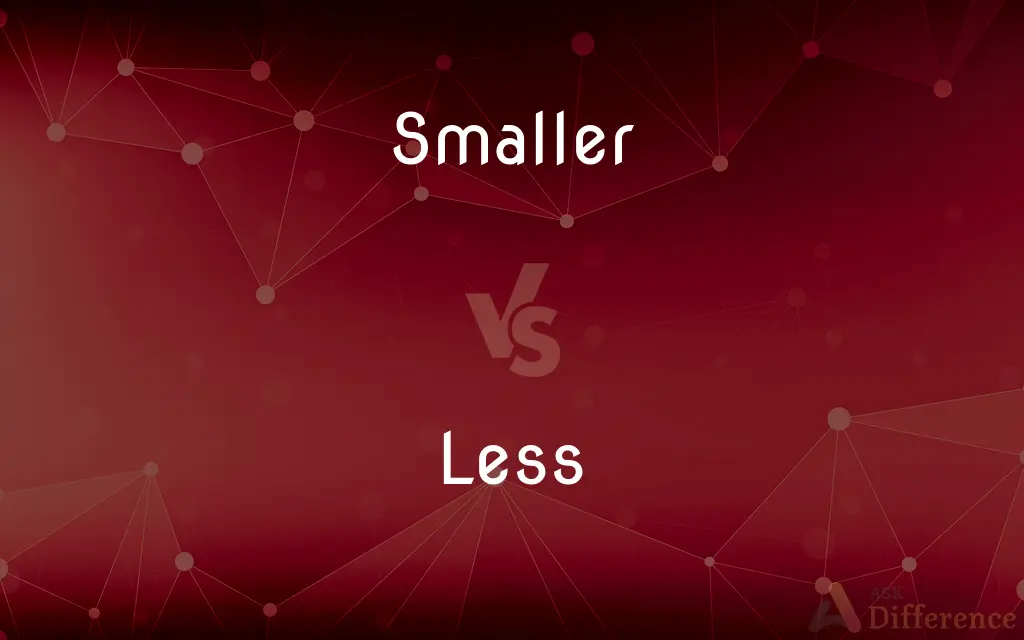Smaller vs. Less — What's the Difference?
By Urooj Arif & Fiza Rafique — Updated on March 29, 2024
Smaller focuses on size, implying a reduction in dimensions or volume, while less refers to quantity, indicating a decrease in number, amount, or degree.

Difference Between Smaller and Less
Table of Contents
ADVERTISEMENT
Key Differences
Smaller is used when discussing physical dimensions, highlighting a comparison in size between two or more objects or entities. It specifically denotes a reduction in spatial dimensions, such as height, width, and depth. Whereas less is applied to non-physical quantities, such as time, money, or abstract concepts, indicating a lower amount or degree.
In terms of usage, smaller is typically applied to countable nouns that have tangible dimensions. For example, comparing the size of two buildings or two pieces of fruit. On the other hand, less is used with uncountable nouns, referring to substances or concepts that cannot be individually counted, such as water, happiness, or honesty.
The choice between smaller and less often depends on the context of the comparison. Using smaller implies a direct, often visible comparison of size. Whereas using less implies a more abstract comparison, focusing on the amount or degree rather than physical dimensions.
When instructing or giving advice, saying "use smaller amounts" would typically refer to physical quantities like ingredients in a recipe, emphasizing the need to reduce the volume or size of what is used. Less, in this context, would refer to reducing intangible quantities, like "use less effort" or "spend less time," focusing on the reduction of non-physical aspects.
In mathematical or scientific contexts, smaller is used to compare numerical values with a direct relation to physical dimensions, such as smaller angles or smaller particles. Less, conversely, is used to discuss quantities like less pressure, less energy, or less intensity, where the comparisons are based on magnitude rather than physical size.
ADVERTISEMENT
Comparison Chart
Usage
Physical dimensions
Quantity or degree
Context
Countable nouns (e.g., items, objects)
Uncountable nouns (e.g., substances, concepts)
Comparison Type
Direct, visible size
Abstract amount or degree
Examples
Smaller car, smaller house
Less water, less happiness
Application
Direct comparison of physical size
Reduction in non-physical aspects
Compare with Definitions
Smaller
Lesser in degree of spatial dimensions.
The smaller twin weighed less at birth.
Less
Of a lower quantity or degree.
Use less sugar in the recipe next time.
Smaller
Comparatively lesser in size among choices.
The smaller portion is enough for lunch.
Less
Indicating a reduction in amount or degree.
There's less interest in the proposal than expected.
Smaller
Reduced in size relative to another object.
The smaller box fit inside the larger one.
Less
Used to denote fewer in number (informally) or lesser extent.
She has less friends in the new city.
Smaller
Of less magnitude or physical dimension.
Choose a smaller font for the footnote.
Less
Signifying a decrease in intensity or strength.
The pain is less severe today.
Smaller
Indicative of a reduced scale or scope.
Start with a smaller, more manageable project.
Less
Expressing a lower rate or frequency.
Less rain fell this month compared to last.
Smaller
Smaller were an English alternative rock, Britpop band from Liverpool, active during the 1990s. They had hits with "Wasted" and "Is" in 1996 and 1997.
Less
Not as great in amount or quantity
Had less time to spend with the family.
Smaller
Being below average in size
A small car.
Less
Lower in importance, esteem, or rank
No less a person than the ambassador.
Smaller
Being below average in quantity or extent
A small donation.
A small project.
Less
Consisting of a smaller number.
Smaller
Limited in importance or significance; trivial
A small matter.
Less
With the deduction of; minus
Five less two is three.
Smaller
Having limited position, influence, or status; minor
"A crowd of small writers had vainly attempted to rival Addison" (Thomas Macaulay).
Less
To a smaller extent, degree, or frequency
Less happy.
Less expensive.
Smaller
Unpretentious; modest
Made a small living.
Helped the cause in my own small way.
Less
A smaller amount
She received less than she asked for.
Smaller
Not fully grown; very young
A small child.
Less
Something not as important as something else
People have been punished for less.
Smaller
Narrow in outlook; petty
A small mind.
Less
Comparative of little
I slept even less last night than I did the night before.
I like him less each time I see him.
Smaller
Having been belittled; humiliated
Their comments made me feel small.
Less
Used for constructing syntactic diminutive comparatives of adjectives and adverbs.
Randal is less welcome than Rachel but as her spouse we should invite them both.
This gadget is less useful than I expected.
I'm not any less happy for being on my own.
Smaller
Diluted; weak. Used of alcoholic beverages.
Less
To a smaller extent or degree.
The grammar book was less than (that is, not at all) helpful.
That this is a positive one makes it no less a stereotype, and therefore unacceptable.
Smaller
Lacking force or volume
A small voice.
Less
(Now chiefly of numbers or dimensions) little; of inferior size, degree or extent; smaller, lesser.
Smaller
Lowercase
Type the password in small letters.
Less
A smaller amount of; not as much.
No less than eight pints of beer.
I have less tea than coffee.
You have even less sense than an inanimate object.
Smaller
In small pieces
Cut the meat up small.
Less
Fewer; a smaller number of.
There are less people here now.
Now there are three less green bottles hanging on the wall.
Smaller
Without loudness or forcefulness; softly.
Less
Minus; not including
It should then tax all of that as personal income, less the proportion of the car's annual mileage demonstrably clocked up on company business.
Smaller
In a small manner.
Less
(archaic) To make less; to lessen.
Smaller
A part that is smaller or narrower than the rest
The small of the back.
Less
(archaic) Lesser; smaller.
Smaller
Small things considered as a group.
Less
A smaller amount or quantity.
Less is better.
I have less to do today than yesterday.
Smaller
Chiefly British Small items of clothing.
Less
Unless
Smaller
Small or little relative to something else
Less
Unless.
Less
Smaller; not so large or great; not so much; shorter; inferior; as, a less quantity or number; a horse of less size or value; in less time than before.
Thus in less [time] than a hundred years from the coming of Augustine, all England became Christian.
Less
Not so much; in a smaller or lower degree; as, less bright or loud; less beautiful.
Less
A smaller portion or quantity.
The children of Israel did so, and gathered, some more, some less.
Less
The inferior, younger, or smaller.
The less is blessed of the better.
Less
To make less; to lessen.
Less
(comparative of `little' usually used with mass nouns) a quantifier meaning not as great in amount or degree;
Of less importance
Less time to spend with the family
A shower uses less water
Less than three years old
Less
(usually preceded by `no') lower in quality;
No less than perfect
Less
(usually preceded by `no') lower in esteem;
No less a person than the king himself
Less
(nonstandard in some uses but often idiomatic with measure phrases) fewer;
Less than three weeks
No less than 50 people attended
In 25 words or less
Less
Used to form the comparative of some adjectives and adverbs;
Less interesting
Less expensive
Less quickly
Less
Comparative of little;
She walks less than she should
He works less these days
Common Curiosities
Can "less" be used with countable nouns?
Traditionally, "less" is used with uncountable nouns, but it's informally used with countable nouns, especially in expressions of time, distance, and money.
Can "less" imply a reduction in quality?
Yes, "less" can indicate a lower degree or quality, such as "less importance" or "less flavorful."
Is "smaller" only applicable to physical objects?
Primarily, yes. "Smaller" is used to describe a reduction in physical dimensions.
How do "smaller" and "less" relate to comparative forms?
Both are comparative forms; "smaller" compares sizes, while "less" compares quantities or degrees.
Can "less" be used to compare two actions?
Yes, in contexts like "less talking, more doing," indicating a preference for action over speech.
When should I use "smaller" instead of "less"?
Use "smaller" for comparisons of physical size, and "less" for comparisons of amount or degree.
Can I use "smaller" and "less" interchangeably in any context?
No, their usage depends on whether you're discussing physical size ("smaller") or amount/degree ("less").
How do "much less" and "much smaller" differ?
"Much less" emphasizes a significant reduction in amount or degree, while "much smaller" emphasizes a substantial decrease in size.
How do cultural perceptions affect the understanding of "smaller" and "less"?
Cultural contexts can influence the interpretation, especially in how quantities, sizes, or degrees of things are valued or understood.
Is "smaller" used in mathematics?
Yes, "smaller" is used to compare numerical values with direct physical implications, like angles or dimensions.
Does "less" have synonyms that can replace it without changing meaning?
Yes, words like "fewer" (for countable nouns) and "lesser" can sometimes replace "less," depending on the context.
Is it correct to say "less people" or "fewer people"?
"Fewer people" is traditionally correct for countable nouns, though "less" is commonly used informally.
Are there exceptions to the rules for "smaller" and "less"?
English usage exceptions exist, such as the informal use of "less" with countable nouns in certain expressions.
How does the use of "smaller" impact visual perception?
"Smaller" directly affects how we visually perceive the relative size of objects, suggesting one is physically less in dimensions than another.
Can "smaller" refer to a reduction in a non-physical sense?
Rarely. While typically about physical size, it can metaphorically suggest a reduction in scope or significance.
Share Your Discovery

Previous Comparison
Wand vs. Willow
Next Comparison
Dock vs. BerthAuthor Spotlight
Written by
Urooj ArifUrooj is a skilled content writer at Ask Difference, known for her exceptional ability to simplify complex topics into engaging and informative content. With a passion for research and a flair for clear, concise writing, she consistently delivers articles that resonate with our diverse audience.
Co-written by
Fiza RafiqueFiza Rafique is a skilled content writer at AskDifference.com, where she meticulously refines and enhances written pieces. Drawing from her vast editorial expertise, Fiza ensures clarity, accuracy, and precision in every article. Passionate about language, she continually seeks to elevate the quality of content for readers worldwide.















































